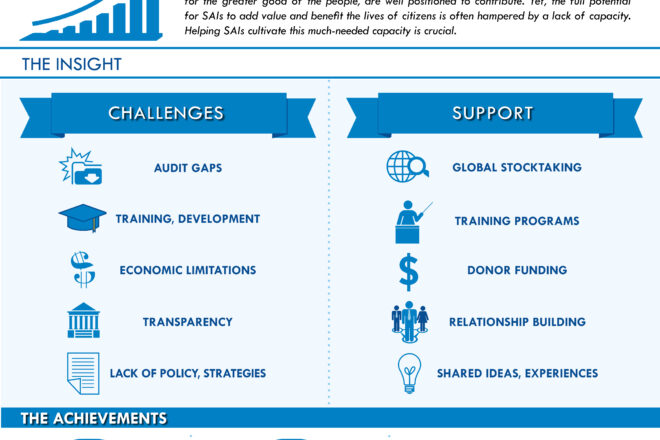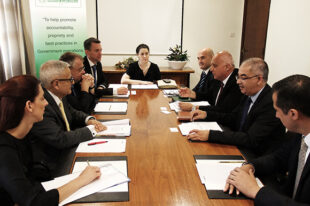The Cooperation’s Work to Unite Donors, SAIs Leads to Success

Supreme Audit Institutions (SAIs) play a critical role in promoting sound financial management and accountable, transparent government. SAIs, largely seen as independent watchdogs acting for the greater good of the people, are well positioned to contribute. Yet, the full potential for SAIs to add value and benefit the lives of citizens is often hampered by a lack of capacity.
Helping SAIs cultivate this much-needed capacity is crucial, and this is where the INTOSAI-Donor Cooperation (Cooperation) excels. There has been much work and many successes since the Cooperation’s inception in 2009; however, communicating the importance of this work, the significance of the SAI mission, and the essential roles that funding and support play can be a challenge.
At the International Organization of Supreme Audit Institutions (INTOSAI) congress in Abu Dhabi, United Arab Emirates, there was much talk of successes…what it is and how it can be achieved. Definitions varied widely, as did the journeys.
When it comes to building capacity, as well as improving and broadening SAI capabilities, success stories take on an entirely new meaning. They inform. They motivate. They inspire. They allow us to see what is possible, particularly when support is united.
Successful outcomes can take time to unfold, as building capacity—that ultimately impacts (and adds value to) the lives of citizens—doesn’t happen overnight. Often, it takes years, which is the case for five insightful, impactful, inspirational stories from the SAIs of Bhutan, Sierra Leone, Kiribati, Tuvalu and Macedonia.
All reported from different parts of the world. All bearing a country-level emphasis. All made possible by joint efforts coming together to achieve a common goal. These stories chronicle organizations that—with the support of INTOSAI, its regional organizations, and global donors—were able to enhance internal capacity that resulted in positive external impacts.
SAI BHUTAN RESPONDS TO EMERGING CHALLENGES
“External support has been instrumental in enhancing the institutional capacity of our audit office,” noted Dasho Tshering Kezang, Auditor General of SAI Bhutan.
The SAI of Bhutan, established as an autonomous public audit body in 1985, has a broad mandate and strong legal framework for enforcing audit recommendations. They are also backed by the nation’s constitution that stresses the SAI’s importance in conducting performance audits. Despite these significant advantages, performance assessments showed the SAI was experiencing difficulty in conducting audits that (1) meet quality standards expected from the international audit community and (2) make a difference to the lives of citizens.
Upon adopting the International Standards of Supreme Audit Institutions (ISSAI) framework in 2010, SAI Bhutan received assistance through several support mechanisms:
Global Stocktaking. The 2010 Global Stocktaking of SAI community needs and support resulted in the World Bank’s funding of the ISSAI Implementation Initiative (3i program), where SAI Bhutan completed Phase 1 in December 2014. The program, implemented by the INTOSAI Development Initiative (IDI), aims to support SAIs in ISSAI implementation. As part of the 3i Program, SAI Bhutan carried out ISSAI compliance assessments to identify gaps and raise awareness.
Global Call for Proposals. Following the Global Call for Proposals in 2011, the Austrian Development Agency (ADA) backed SAI Bhutan’s project proposal designed to enhance professionalism in the delivery of audit services. As part of this project, several audit manuals and policies were developed, among them a policy document on auditing from a gender perspective.
SAI PMF Assessment. The Office of the Auditor General of Norway and the INTOSAI-Donor Secretariat conducted a peer review in 2013 using the pilot SAI Performance Measurement Framework (PMF).
SAI Capacity Development Fund (SAI CDF). SAI Bhutan also received support from the SAI CDF, financed by SECO (Switzerland) and administered by the World Bank, to further enhance ISSAI implementation, focusing on improving audit quality in all audit streams.
With support from ADA, SAI Bhutan conducted three pilot audits following the new ISSAI framework. According to the SAI PMF assessment, the pilot audits scored significantly higher than other reviewed audits, illustrating the program’s success and SAI Bhutan’s performance improvement. The SAI PMF assessment also provided input toward SAI Bhutan’s Strategic Plan 2015-2020.
Impacts associated with audit professionalization have extended well beyond the SAI, particularly in the realm of public debt—a key national challenge. SAI Bhutan participated in the IDI public debt auditing program funded by the Norwegian Ministry of Foreign Affairs, and the SAI’s 2014 audit report on public debt management, debated extensively in Bhutan’s parliament, received positive feedback by Bhutan’s Ministry of Finance (MOF).
Based on the audit recommendations, the MOF developed a Public Debt Policy that was put into effect in 2016. It provides both a single overall threshold, as well as sector-specific thresholds for external debt. Shortly after the policy’s implementation, the MOF also established a new department of Macroeconomic Affairs, whose mission is to “maintain a sustainable level of public debt.”





